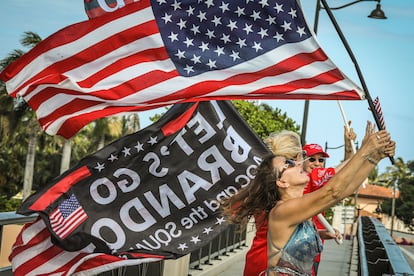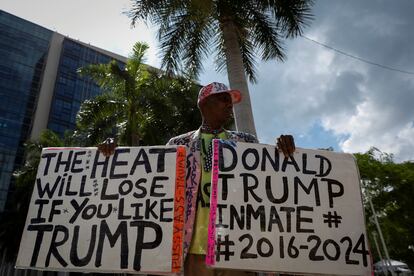Thousands of guests and nuclear secrets in the bathroom: How Donald Trump hid classified papers at Mar-a-Lago
The indictment paints a picture of the former president’s life at the Florida mansion, where he stored hundreds of top secret documents after leaving office. The case is set to test U.S. democracy and the judicial system


It’s Friday afternoon at the gates of Mar-a-Lago. In the last parking area before the bridge that leads to Donald Trump’s residence in Palm Beach, Florida, there are journalists, a handful of snapper fishermen and some Trump supporters with a megaphone. Including guy who calls himself Baked Alaska, who defines himself as an “extreme right-wing influencer” and is recording everything with his cell phone. He has just been released from prison for taking part in the January 6 attack on the Capitol, for which he was sentenced to 60 days behind days.
He’s there with Retiree Debbie Macchia, who says she spends every weekend at the entrance road to the residential estate, the kind that shows that good taste is almost never bought with money. According to Macchia, on a “big day,” around 500 people come together, and if they’re lucky Trump will drive past in his caravan of armored vehicles. “Sometimes, like on January 6, he sends out cookies for all of us. This weekend, we don’t know when he will be arriving from his home in New Jersey. The only clear thing is that interesting days are ahead,” she adds.

Mar-a-Lago — a 126-room Mediterranean-style mansion, shielded by secret service agents — became the center of a political and legal hurricane last week, when Trump was charged for withholding hundreds of secret and classified documents at his Florida home after leaving office. Two parallel investigations, one led by the FBI and another by a grand jury, have ended in an indictment against Trump. The former president will have to testify next Tuesday at a federal courthouse in downtown Miami. It is the second time that Trump has been charged: in April, he was also indicted over his involvement in hush money paid to porn star Stormy Daniels. It is also the first time in history that a former president has faced federal crimes — seven, to be exact.
The details of the case, which promises to test the U.S. judicial system and the very workings of U.S. democracy, are outlined in an explosive 49-page indictment filed Friday by Jack Smith, the special counsel appointed by the Department of Justice. In total, Trump faces 37 felony counts: 31 for the willful retention of national defense information under the Espionage Act; three for withholding and concealing a document, two for false statements and representations; and one for conspiracy to obstruct justice with his aide, Walt Nauta. The indictment accuses Nauta of withholding records,concealing documents and making false statements.
“A risk to foreign relations”
The classifed documents kept at Mar-a-Lago included information about U.S. nuclear weapons, the nuclear capabilities of a foreign country and the military activities or capabilities of other countries, as well as response plans in the case of a nuclear attack. While there is no record that the people who accessed the papers without authorization intended to spy on the U.S., the indictment said the mere possibility posed a “risk to the national security of the United States, foreign relations, the safety of the United States military, and human sources and the continued viability of sensitive intelligence collection methods.”
Although the legal jargon is difficult to understand at times, the carefully written indictment reads like a gipping suspense novel, filled with intimate details about life at Mar-a-Lago. The mansion hosted more than 150 events, “including weddings, movie premieres and fundraisers,” drawing “tens of thousands of guests” between January 2021 and last August 8, the day when FBI agents arrived at Mar-a-Lago to search for material that Trump had failed to hand over. By law, the documents are the property of the National Archives and no president can claim them as their own. Not even President Joe Biden, who is at the center of another investigation into his handling of documents from his time as vice president that were found years later in a private office and at his Delaware residence.
The indictment filed by Smith — who Trump has called a “deranged lunatic” — also comes with illustrations: the 49-page document includes photographs of where the boxes of classified documents were kept at Mar-a-Lago, while the text explains how they were moved from one place to another.

To begin with, some of the boxes were stored on the stage of the White and Gold Ballroom, in the main building of the Mar-a-Lago club, which has hundreds of members and more than 150 employees. Some of the boxes were then moved to the business center at the club, which includes a spa, gift shop, gyms, outdoor pool and courtyard. When an employee asked if the boxes could be moved so that staff could use the room as an office, the documents ended up in the bathroom of the “lake room,” which is near the tower, the most distinctive architectural feature of Mar-a-Lago. Shortly after, Trump ordered a storage room on the ground floor to be cleaned out to accommodate 80 boxes. According to the indictment, the door to that storage room was often open.
Classified papers next to a shower
Two particular images from the indictment caught the public’s attention on Friday. The first shows a box of documents blocking access to a shower, while the second — taken by Nauta in December 2021 — shows an open filing cabinet, with the contents all over the floor. He sent the photo to a colleague, who texted back: “Oh no oh no.” Around that time, some boxes were moved to the part of Mar-a-Lago, where the Trump family stays when they are in Florida. When the FBI entered the house, they found 75 boxes in the storage room and 27 in the bedroom area. All contained material marked as “confidential,” “secret” and “top secret.”
The indictment includes transcripts of conversation between Mar-a-Lago workers captured by security cameras, although only Nauta — who told the FBI he was not aware of the classified documents — is cited by name. In May 2022, when Trump was told by his lawyer that the grand jury was demanding the return of any documents marked as classified, the former president allegedly replied: “Wouldn’t it be better if we just told them we don’t have anything here?”
The 49-page document also includes a surrealist conversation between Trump, a publisher, a writer and an unnamed employee. Durinth meeting, Trump appears to show the three a classified Pentagon report on a hypothetical attack on Iran.
- Trump: “As presidenti I could have declassified it.”
- Staffer: “Yeah”
- Trump: “Now I can’t, you know, but this is still a secret.
- Staffer: Yeay. Now we have a problem.
- Trump: Isn’t that interesting?
According to historian Russell L. Riley, co-director of the Miller Center for Oral History of Presidents at the University of Virginia in Charlottesville, this evidence indicates that Trump’s behavior was not only “terribly reckless,” but also “foolish.” “As someone who dedicates himself to studying our leaders without partisan bias, I can’t help but be frustrated by the six years we’ve had to deal with him. In my opinion, the indictment shows that he has always been convinced that whatever he does, he will get away with it,” he said in a telephone interview on Friday.
“As president, he could not take those boxes, regardless of theIR content. It’s as if he took furniture or computers from the White House. The law does not contemplate a punishment for that specific behavior, because it did not foresee the existence of a president with such indecent behavior,“ he added.
Riley doesn’t think the latest news will sway voters in the United States, where the case is either proof that no one is above the law or that the justice system is also partisan. Trump has announced his 2024 White House run, and is the favorite to win the Republican presidential primaries, with 50% of support. All signs indicate that Trump’s presidential campaign will take place between rallies and the courtroom. Republicans, save a few exceptions, have rushed to his defense, arguing that federal agencies have been politically weaponized.
It’s a belief shared by Trump supporters like Debbie Macchia and her friends, who are willing to spend the weekend in a roadside parking lot in the summer heat. They believe he is a victim of “a witch hunt.” “You cannot reason someone out of something he or she was not reasoned into,” explained Riley, quoting Jonathan Swift, in reference to Trump’s diehard followers.
Macchia says that she will be back at the gates of Mar-a-Lago on Tuesday, when Trump must appear in court in Miami. “And on Wednesday, because in addition to being Flag Day, it is the [77th] birthday of President Trump.” According to Macchia, Trump supporters are also organizing to demonstrate in front of the courthouse to show their support. The city will even reserve a lane of the I-95 highway so that Trump can cover the 68 miles that separate Mar-a-Lago from the court.

The Department of Justice decided to present the case in South Florida and not in Washington — where security would have been easier — in order to avoid possible legal challenges over jurisdiction. After all, the alleged crimes were committed in Palm Beach. That decision was made knowing that it the case could land in the hand of Judge Aileen Cannon, who was appointed by Trump. Last year, she agreed to suspend the Mar-a-Lago investigation until a special master could review the documents — a decision that was overturned by an appeals court.
Cannon is tasked with directing the grand jury and imposing the sentence. If the former president is found guilty, in theory, he could face up to 400 years in prison. But in practice, sentences are usually far shorter than the maximum. At Trump’s age, that could still mean spending the rest of his life behind bars, barring pardons or parole.
Baked Alaska, the far-right influencer, believes that if Trump is sentenced, he will soon be pardoned. He believes that Trump will win the election, get himself out of jail, along with “a lot of other innocent people” and put a bunch of other people in prison, starting with “[White House chief medical officer] Anthony Fauci and [former speaker of the House of Representatives] Nancy Pelosi.”
After all, if Trump ends up behind bars, there is legally nothing stopping him from becoming president. He could even serve from behind bars.
Sign up for our weekly newsletter to get more English-language news coverage from EL PAÍS USA Edition
Tu suscripción se está usando en otro dispositivo
¿Quieres añadir otro usuario a tu suscripción?
Si continúas leyendo en este dispositivo, no se podrá leer en el otro.
FlechaTu suscripción se está usando en otro dispositivo y solo puedes acceder a EL PAÍS desde un dispositivo a la vez.
Si quieres compartir tu cuenta, cambia tu suscripción a la modalidad Premium, así podrás añadir otro usuario. Cada uno accederá con su propia cuenta de email, lo que os permitirá personalizar vuestra experiencia en EL PAÍS.
¿Tienes una suscripción de empresa? Accede aquí para contratar más cuentas.
En el caso de no saber quién está usando tu cuenta, te recomendamos cambiar tu contraseña aquí.
Si decides continuar compartiendo tu cuenta, este mensaje se mostrará en tu dispositivo y en el de la otra persona que está usando tu cuenta de forma indefinida, afectando a tu experiencia de lectura. Puedes consultar aquí los términos y condiciones de la suscripción digital.








































